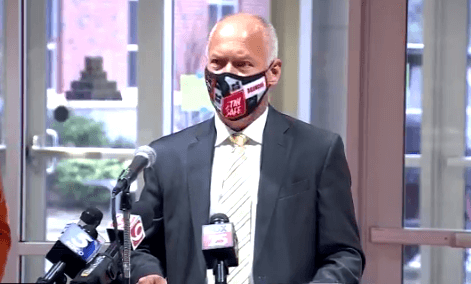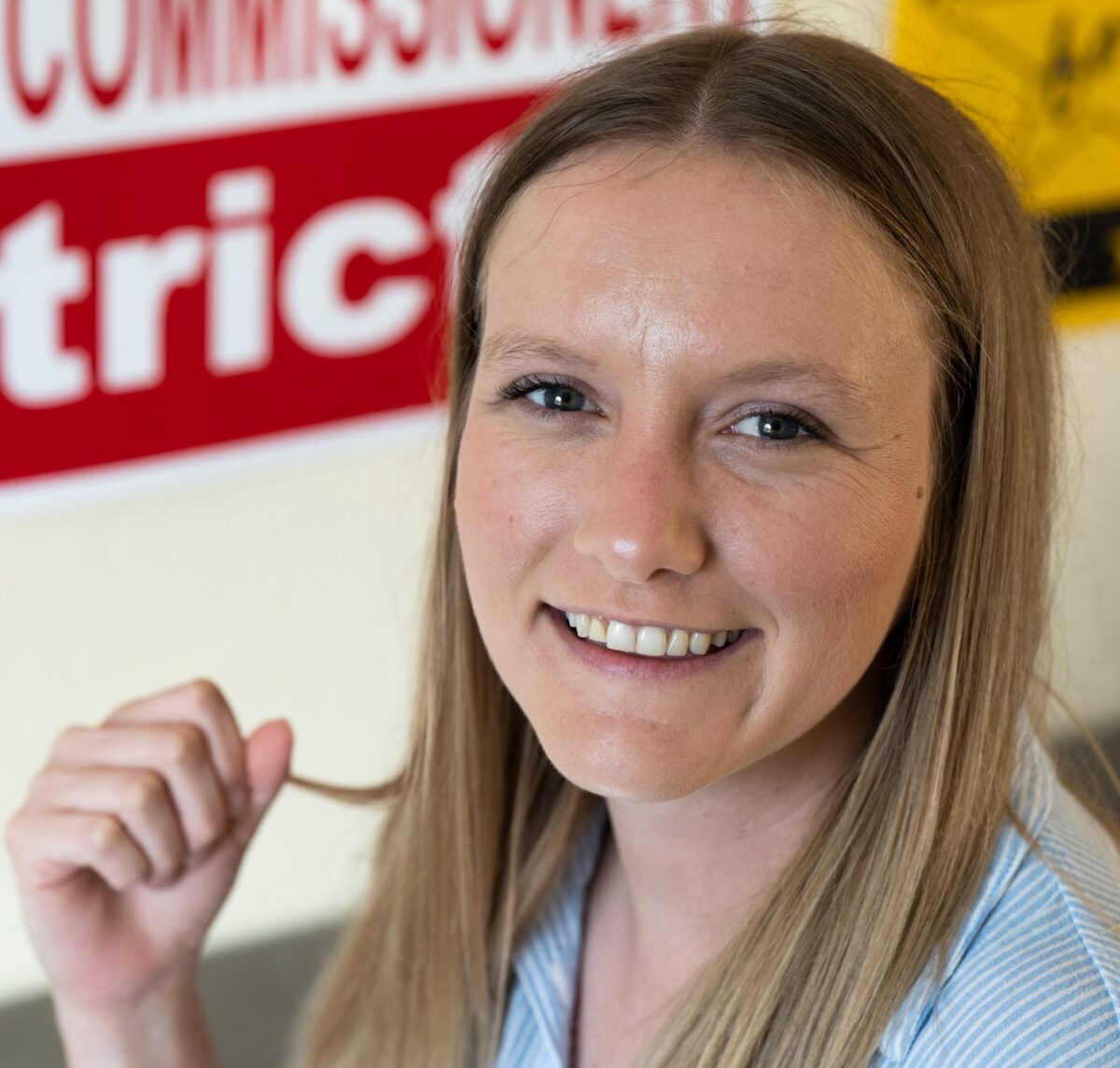

The Oklahoma State Department of Health has developed a policy change to allow students who have been exposed to COVID-19 to quarantine in school.
“Quarantines have caused great disruption in schools and classrooms, despite our best efforts. For this reason, the State Department of Health rolled out a new voluntary policy this past week that allows asymptomatic students who have been exposed to COVID-19 inside the classroom to quarantine,” Commissioner of Health Dr. Lance Frye said during a Wednesday press conference.
Participation is optional for schools, and they must meet specific criteria including the availability of facilities that allow students to follow social distancing guidelines, as well as frequent COVID testing for students.
Mustang Public Schools will be the first district to participate in the pilot program launching at Mustang High School, which has an enrollment of about 3,500 students. Frye said Mustang was approached about the program owing to the district’s data keeping throughout the semester thus far.
“Throughout the pandemic, we’ve worked to find an improved balance between the need to protect public health, including the health of our teachers and students, and the very critical role that public education plays in Oklahoma,” Frye said. “On a recent tour of Mustang Schools, I was impressed by the very detailed system that Superintendent (Charles) Bradley and his team had in place.”
The pilot program will run through Dec. 23, with data being monitored and students being tested for COVID daily.
“We feel confident that this pilot will further our understanding of disease transmission within the classroom and protect our students effectively and keep infected students and teachers from entering the classroom setting,” Frye said. “It’s an innovative way to safely keep kids in schools so they can continue their academic studies and will give us more data to drive our response to the virus.”
‘We have to be safe, but we have to get our kids back in school’
Charles Bradley, superintendent of Mustang Public Schools, outlined the program goals during Wednesday’s conference: health and safety, flexibility for schools and daily testing for students.
He said the district chose the high school for the program since it is already operating on an A/B schedule. They then identified a location on the high school campus with a single entry and exit, an area for testing and a learning environment space that would provide adequate room for social distancing guidelines.
“The other part of that is staffing. That’s where we are right now, trying to identify an adult to supervise the setting,” Bradley said. “Since this is a new program, we want to make sure we’re educating everyone about what this pilot program is about, what it is not about, that way people can have an informed decision whenever they’re looking at whether they want to be a part of this or not.”
Mustang Public Schools is still trying to identify a staff member for the position and is waiting on the availability of the rapid COVID tests to begin identifying students and letting parents decide if they want their kids to participate in the program.
“We’re looking forward to collecting any data that would help us for our long-term goals of providing face-to-face instruction on an ongoing basis,” Bradley said.
Mustang Public Schools has an internal mask mandate policy when Canadian County is designated as an “orange level one” threat level. The county is currently at a red level. All participants in the pilot program will have to wear face masks regardless of the county threat level.
During the press conference, Oklahoma Secretary of Education Ryan Walters said learning happens best in the classroom and that he appreciates Bradley for thinking outside of the box.
“We have to heavily consider the academic ramifications of students not being in school in addition to their health outcomes,” Walters said. “We have to be safe, but we have to get our kids back in school. Their future successes depend on it.”
‘It’s unconscionable to me’
Alicia Priest, president of the Oklahoma Education Association, said she believes quarantining students in schools is dangerous and irresponsible.
“I can’t believe that the Oklahoma Department of Health would use our students and teachers, as well as support staff, to have an experimental pilot,” Priest said. “It’s unconscionable to me.”
Priest said she hopes students and teachers won’t volunteer to participate in the program. However, she’s worried that some teachers may feel pressured to do so.
“If an administrator or supervisor who has control of my job comes and asks me if I’ll volunteer, and that person has control over if I’m rehired, that is not an actual volunteer situation,” Priest said.
She said safety has to come first.
“We all believe the best learning happens in school, but we also know our students and staff have to be safe while doing that,” Priest said.
Mustang parents show concern and support
Some Mustang parents also have concerns about the plan to allow students to quarantine in-school. Emily Piland has two sons, a 10th and a 12th grader, who attend Mustang High School. Both of them have autoimmune conditions.
“To be honest, it makes me angry. I feel like they’re using our students as guinea pigs,” Piland said. “It’s a test program, and if they want to do tests it should be on adults. It should never be on children.”
Despite the school’s plan to keep exposed students isolated from other students and to practice social distancing within the in-school quarantine area, Piland thinks interaction with exposed students is inevitable. She also worries about the accuracy of the rapid COVID tests that will be given to students.
“It’s hard to get kids to socially distance,” Piland said. “I’ve had three providers tell me that those rapid tests are 50/50.”
Piland said she’s not happy with the Mustang Board of Education’s decision to approve this program.
“I just don’t have any respect for our new superintendent. I’ve tried to reach out to him for other issues and didn’t get a response from him or anyone else,” Piland said.
Some parents disagree with Piland.
Christina Bouska’s son is a senior at Mustang High School, and she said he would be willing to participate in the program.
“I applaud Mustang for pushing forward with this pilot program. Somebody has got to do it — to figure out how much kids actually are affecting the transmission of the virus,” Bouska said.
She said she has been pleased with the COVID data and information that the district has been providing parents every week.
“If any school district was going to lead the way, I’m glad it’s Mustang,” Bouska said. “They have really stepped up and provided a lot of information to go to.”
House Democrats ask for reconsideration
On Monday, the Oklahoma House Democratic Caucus’ education policy team sent a letter to Frye asking him to reconsider the decision.
The letter questioned whether group quarantining is a safe option and if there is any evidence that shows it won’t lead to further virus spread. It also questioned who would be supervising the students.
The letter was signed by Rep. Andy Fugate (D-Del City), Rep. Melissa Provenzano (D-Tulsa), Rep. Trish Ranson (D-Stillwater), Rep. Jacob Rosecrants (D-Norman) and Rep. John Waldron (D-Tulsa).
“We all agree the best place for quality learning is via in-person schooling – but we cannot risk student and staff safety and health in our quest to do this. This surprise decision feels like a plan was developed in a vacuum with little to no input from experienced education professionals,” the letter said.





















